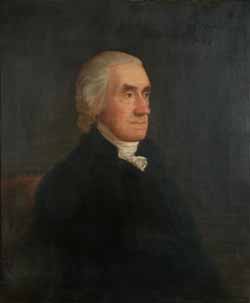“Success in this troublesome affair”?
When I broke off yesterday, Capt. Simeon Potter of Bristol, Rhode Island, had just hit the Rev. John Usher in the face.
And then he did it again.
According to the minister’s son, Hezekiah Usher, that “made the blood fly out of his Mouth.”
The younger Usher described rushing out from his doorway:
In the fall of 1761, the Rev. John Usher sued Capt. Simeon Potter for the punches “…And also the left Thumb of the Plaintiff at said Time & Place did Sprain by all which the Plaintiffs Life was despaired of.” He asked for “Fifty Thousand Pounds current Money of New England” in damages.
Capt. Potter threw up every roadblock. He argued that he’d been an unarmed man acting in self-defense. That Usher shouldn’t have sued in Newport. That “this Cause might be continued to next Court as he is not provided with an Attorney and his principal Evidence is at Sea.” Ultimately Potter put up no defense and defaulted, and the county court awarded Usher £1,000 plus costs.
Both parties appealed to the Rhode Island Superior Court of Judicature, Usher “because the Damages given were not adequate to the Injury recd.” and Potter because the verdict was “wrong and erroneous and ought to be reversed.”
Meanwhile in January 1762 a grand jury in Bristol County considered criminal assault charges against Capt. Potter. I can’t tell how far that process got.
In the summer of 1762 Potter called in a big legal gun from Massachusetts: Robert Treat Paine (shown above, later in life). Paine’s 6 August letter assured Potter that he could appeal both criminal and civil cases with “the Deposition you have of the Jurys dissatisfaction in their Verdict.” Paine called Usher “a Crafty powerfull Antagonist” and closed “wishing you success in this troublesome affair & that you may finally prevail against Ecclesiastical or Political Tyranny.”
On 10 September, Paine traveled to Newport to argue for Potter. The captain was presenting testimony from several witnesses not heard at the original civil trial.
TOMORROW: Examining the evidence.
And then he did it again.
According to the minister’s son, Hezekiah Usher, that “made the blood fly out of his Mouth.”
The younger Usher described rushing out from his doorway:
I run and catch him [Potter] by the collar & took him off from my Father and received two blows in my Face from sd. Potter.The captain’s father, Hopestill Potter, aged about seventy-one, also joined the fray. Eventually the minister and captain were pulled apart.
In the fall of 1761, the Rev. John Usher sued Capt. Simeon Potter for the punches “…And also the left Thumb of the Plaintiff at said Time & Place did Sprain by all which the Plaintiffs Life was despaired of.” He asked for “Fifty Thousand Pounds current Money of New England” in damages.
Capt. Potter threw up every roadblock. He argued that he’d been an unarmed man acting in self-defense. That Usher shouldn’t have sued in Newport. That “this Cause might be continued to next Court as he is not provided with an Attorney and his principal Evidence is at Sea.” Ultimately Potter put up no defense and defaulted, and the county court awarded Usher £1,000 plus costs.
Both parties appealed to the Rhode Island Superior Court of Judicature, Usher “because the Damages given were not adequate to the Injury recd.” and Potter because the verdict was “wrong and erroneous and ought to be reversed.”
Meanwhile in January 1762 a grand jury in Bristol County considered criminal assault charges against Capt. Potter. I can’t tell how far that process got.
In the summer of 1762 Potter called in a big legal gun from Massachusetts: Robert Treat Paine (shown above, later in life). Paine’s 6 August letter assured Potter that he could appeal both criminal and civil cases with “the Deposition you have of the Jurys dissatisfaction in their Verdict.” Paine called Usher “a Crafty powerfull Antagonist” and closed “wishing you success in this troublesome affair & that you may finally prevail against Ecclesiastical or Political Tyranny.”
On 10 September, Paine traveled to Newport to argue for Potter. The captain was presenting testimony from several witnesses not heard at the original civil trial.
TOMORROW: Examining the evidence.



